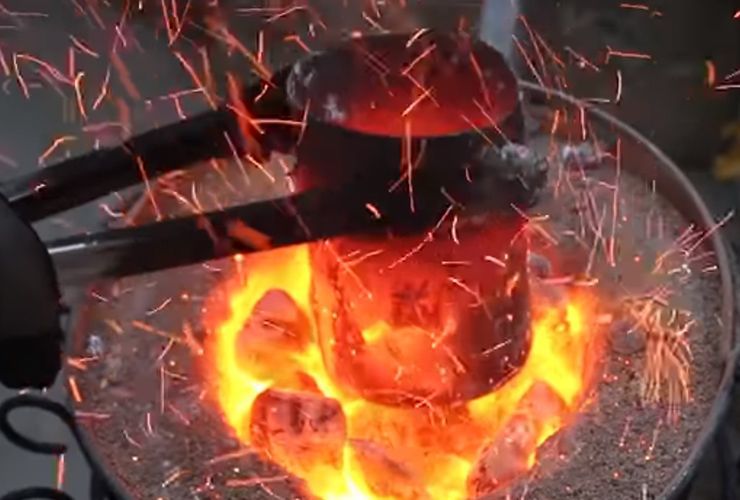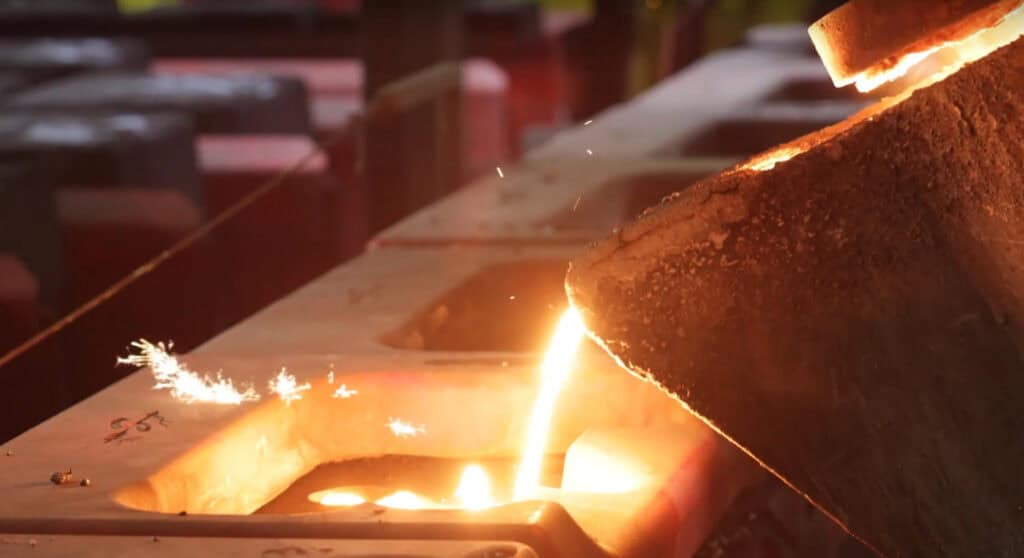Understanding the role of an Aluminum Foundry in today’s industrial landscape
Just How a Metal Foundry Contributes to Sustainable Metal Manufacturing Practices
Metal foundries play a crucial duty in advertising sustainability within the metal production industry. By incorporating recycled products, they lower reliance on virgin sources and decrease environmental impacts. Energy-efficient melting procedures even more minimize energy intake and discharges. The journey towards sustainable practices includes more than simply recycling and energy monitoring. It encompasses a wider commitment to ethical sourcing and cutting-edge technologies. The implications of these techniques are substantial and warrant more detailed exam.
The Duty of Recycling in Metal Foundries
While metal production has commonly depended on virgin materials, the raising focus on sustainability has brought about a substantial change in techniques, particularly in metal foundries. Recycling has actually arised as an essential part of this makeover, allowing foundries to repurpose scrap metal and minimize reliance on extracted sources. By integrating recycled materials right into their procedures, foundries not only lower ecological effect but also reduced manufacturing expenses.
The use of recycled steels, such as copper, light weight aluminum, and steel, lessens power usage and lowers greenhouse gas discharges connected with conventional mining and refining approaches. Foundries can accomplish top quality outputs by using sophisticated sorting and handling innovations to ensure the purity of recycled materials. This emphasis on recycling fosters a circular economic situation, where waste is lessened, and sources are utilized efficiently. As a result, metal foundries play a critical duty in advertising sustainable techniques within the metal production market.
Energy-Efficient Melting Strategies
Energy-efficient melting techniques are essential for enhancing sustainability in metal production. These techniques significantly minimize power consumption during the melting process, which is among one of the most energy-intensive phases in metal production. Technologies such as induction melting, resistance heating, and microwave melting offer enhanced efficiency compared to traditional techniques. Induction melting, for example, uses magnetic fields to produce warm straight within the metal, decreasing energy loss and giving accurate temperature control.
In addition, implementing heat recovery systems can further enhance efficiency by capturing and recycling waste warm generated during melting. Utilizing innovative insulation products and maximizing furnace designs likewise add to energy financial savings. By adopting these cutting-edge melting strategies, metal foundries can decrease their carbon footprint, minimize operational expenses, and add to a much more lasting production landscape. The integration of energy-efficient practices not just lines up with ecological goals but additionally meets the expanding demand for accountable production methods in the metal industry.
Sustainable Sourcing of Raw Materials
Lasting sourcing of resources is vital for reducing the ecological effect of metal manufacturing. This includes the boosted use of recycled steels, the fostering of honest mining techniques, and campaigns intended at regional sourcing. By prioritizing these approaches, the industry can promote liable source administration and support local economic situations.

Recycled Metal Use
Just how can industries effectively decrease their environmental effect while fulfilling the expanding demand for metal? One considerable technique is the application of recycled metal. By including scrap metal right into their manufacturing processes, foundries can lower the removal of virgin products, thus lowering and saving all-natural resources energy consumption. Recycled metals require much less energy to process compared to their raw equivalents, causing reduced greenhouse gas exhausts. Additionally, making use of recycled metal helps draw away waste from landfills, promoting a round economic climate. Industries that prioritize recycled metal not just add to sustainability but also take advantage of expense savings related to decreased material purchase. Consequently, recycled metal use stands as an essential approach for ecologically responsible metal production.
Moral Mining Practices
While the demand for steels continues to increase, sectors are increasingly identifying the value of ethical mining techniques in guaranteeing accountable sourcing of basic materials. Ethical mining incorporates a commitment to ecological stewardship, social responsibility, and adherence to reasonable labor practices. Business are currently prioritizing collaborations with mines that show openness in their operations, lessening eco-friendly impact and valuing local communities. This strategy not only cultivates a sustainable supply chain yet also enhances the credibility of businesses included. By executing rigorous standards and accreditations, sectors can fight illegal mining tasks and advertise the welfare of workers. Eventually, honest mining techniques add considerably to a more lasting metal manufacturing community, straightening economic development with social and environmental integrity.
Local Sourcing Initiatives

Technologies in Metal Casting Procedures
Innovations in metal casting processes are transforming the sector by including sophisticated recycling methods that decrease waste. Energy-efficient melting techniques are likewise being established to lower power usage throughout production. Additionally, the use of innovative mold and mildew products adds to boosted efficiency and sustainability in casting procedures.
Advanced Recycling Techniques
Advanced recycling strategies are changing metal casting procedures, substantially enhancing sustainability in the industry. These advancements focus on reclaiming and recycling scrap metal, significantly minimizing waste and the demand for virgin materials. Techniques such as hydrometallurgy and pyrometallurgy allow foundries to remove important steels from utilized elements, ensuring efficient resource application. Additionally, progressed sorting and purification modern technologies enhance the high quality of recycled metals, making them appropriate for high-performance applications. This not just minimizes the environmental impact of metal production but also promotes a circular economy by advertising the reuse of materials. As these recycling approaches proceed to develop, they assure to even more simplify operations within foundries and contribute to a much more lasting metal manufacturing landscape.
Energy-Efficient Melting Methods
While typical melting methods have long been the foundation of metal casting, recent advancements have actually presented energy-efficient techniques that substantially lower power usage and discharges. Technologies such as induction melting and Recommended Site electric arc heating systems have actually obtained prominence, enabling for exact control over temperature level and reducing the demand for nonrenewable fuel sources. These approaches not just enhance energy effectiveness yet additionally advertise much faster melting times, which translates to lower operational costs. Furthermore, advancements in warmth recuperation systems enable foundries to capture and reuse excess heat produced during the melting process. This holistic method to energy administration not only supports lasting techniques yet also settings metal foundries as leaders in the shift towards greener manufacturing processes, further lining up with worldwide sustainability objectives.
Ingenious Mold Materials
As the demand for even more reliable and lasting metal casting processes grows, the exploration of cutting-edge mold and mildew materials has become a focal factor in the sector. Traditional mold materials commonly add to environmental challenges, prompting the search for options that decrease waste and energy intake. Recent developments include the growth of recyclable composites and eco-friendly binders, which not just enhance mold and mildew efficiency but additionally lessen environmental impact. Additionally, the use of 3D printing innovation in mold production permits for intricate styles that lower product use and allow rapid prototyping. These cutting-edge materials not just improve casting precision but also straighten with sustainability goals, showcasing the market's commitment to minimizing its carbon footprint while preserving top quality manufacturing standards.
Lowering Waste With Advanced Modern Technology
Ingenious innovations are transforming the metal production market by considerably reducing waste and enhancing effectiveness. Advanced data analytics and artificial intelligence formulas make it possible for foundries to maximize production processes, lessening and determining ineffectiveness scrap product. Smart sensing units check tools efficiency in real-time, permitting anticipating upkeep that minimizes downtime and waste generation. In addition, additive production techniques, such as 3D printing, permit for the production of complicated elements with minimal material use, significantly reducing waste compared to traditional methods.
Closed-loop systems are becoming much more common, where scrap metal and byproducts are reused back into the production cycle, making sure that products are utilized to their fullest potential. This combination of modern technology not just promotes resource conservation however also boosts the total sustainability of metal manufacturing practices. By welcoming these advancements, foundries can add to a more sustainable future while maintaining competitiveness in the market
The Impact of Foundries on Carbon Impact Reduction
Foundries play a vital duty in reducing the carbon footprint of the metal production sector by carrying out different sustainable techniques. By making use of energy-efficient technologies, such as electrical arc furnaces, these facilities considerably reduced greenhouse gas discharges contrasted to traditional methods. Additionally, foundries increasingly take on eco-friendly power sources, which also diminishes their reliance on nonrenewable fuel sources.
Reusing scrap metal is an additional essential technique more helpful hints that foundries use, conserving sources and decreasing the requirement for virgin materials. This not only lessens waste yet also minimizes the energy-intensive extraction procedures related to mining. Furthermore, the adoption of closed-loop water systems helps to lessen water use and lower wastewater discharge, adding to a more lasting procedure.
With these campaigns, foundries show their commitment to environmental stewardship, causing a significant decrease in the total carbon impact of the metal manufacturing sector. Their ongoing efforts are critical in the shift toward a more sustainable commercial landscape.
Regularly Asked Inquiries
What Kinds of Metals Are The Majority Of Generally Recycled in Foundries?
Light weight aluminum, copper, brass, and steel are amongst the most typically recycled metals in foundries. These steels are preferred go to this web-site as a result of their high recycling rates, economic worth, and prevalent availability, contributing greatly to industrial sustainability efforts.
Exactly How Do Foundries Guarantee the High Quality of Recycled Materials?
Foundries establish the high quality of recycled materials via extensive screening, sorting, and purification procedures. They implement innovative technologies to analyze structure and eliminate pollutants, ensuring that the recycled steels meet industry criteria for efficiency and safety and security.
What Accreditations Exist for Sustainable Foundry Practices?
Different accreditations exist for sustainable foundry methods, including ISO 14001 for environmental management, ISO 50001 for energy monitoring, and LEED certification for sustainable structure methods (Metal Foundry). These qualifications aid assure adherence to environmental and sustainability standards in operations
Exactly How Do Foundries Measure Their Carbon Footprint Decrease?
Foundries measure carbon impact reduction with devices like lifecycle evaluations, energy audits, and discharges tracking systems. They contrast baseline discharges to existing outputs, examining improvements in energy efficiency, product usage, and renewable resource adoption in time.
What Are the Financial Advantages of Sustainable Metal Manufacturing?
Sustainable metal manufacturing uses financial benefits such as decreased functional prices, increased effectiveness, boosted market competition, and prospective federal government motivations. Additionally, it cultivates development and brings in environmentally mindful customers, inevitably driving long-term success for services.
Metal foundries play a crucial duty in promoting sustainability within the metal production industry. While metal production has typically depended on virgin materials, the boosting focus on sustainability has led to a considerable change in techniques, particularly in metal foundries. By incorporating scrap metal into their production processes, foundries can decrease the extraction of virgin materials, thus reducing and conserving all-natural sources power usage. Foundries play a crucial duty in decreasing the carbon impact of the metal manufacturing industry by executing various lasting techniques. Recycling scrap metal is an additional vital method that foundries use, preserving resources and lowering the demand for virgin products.